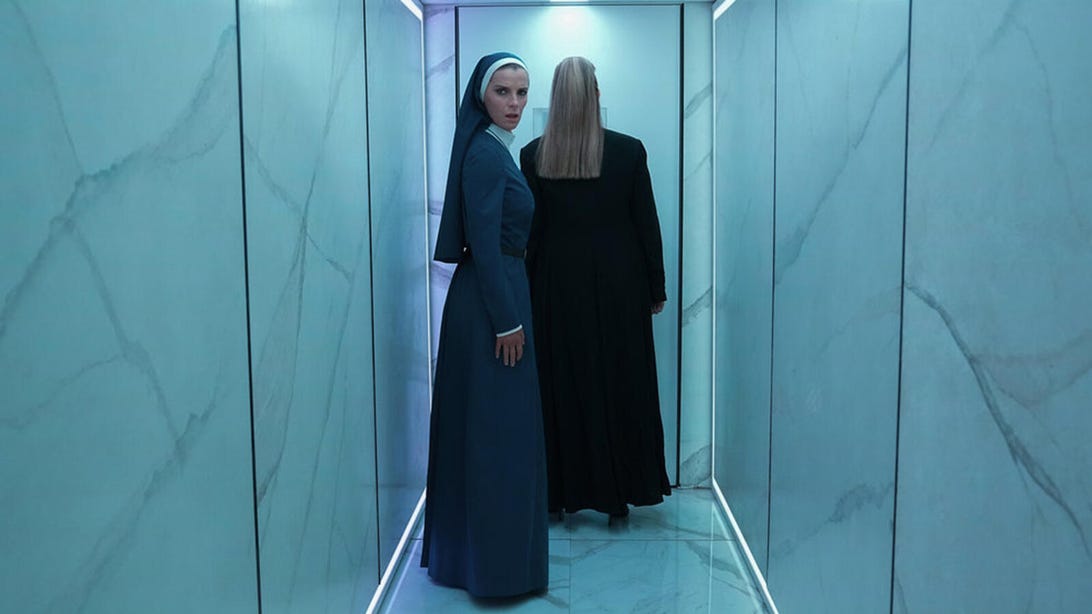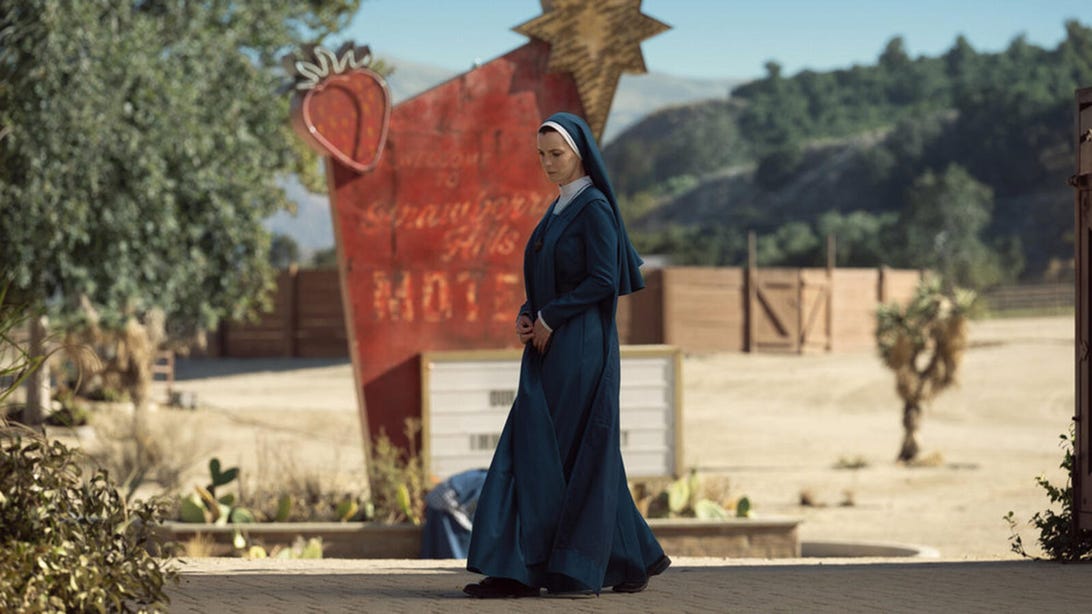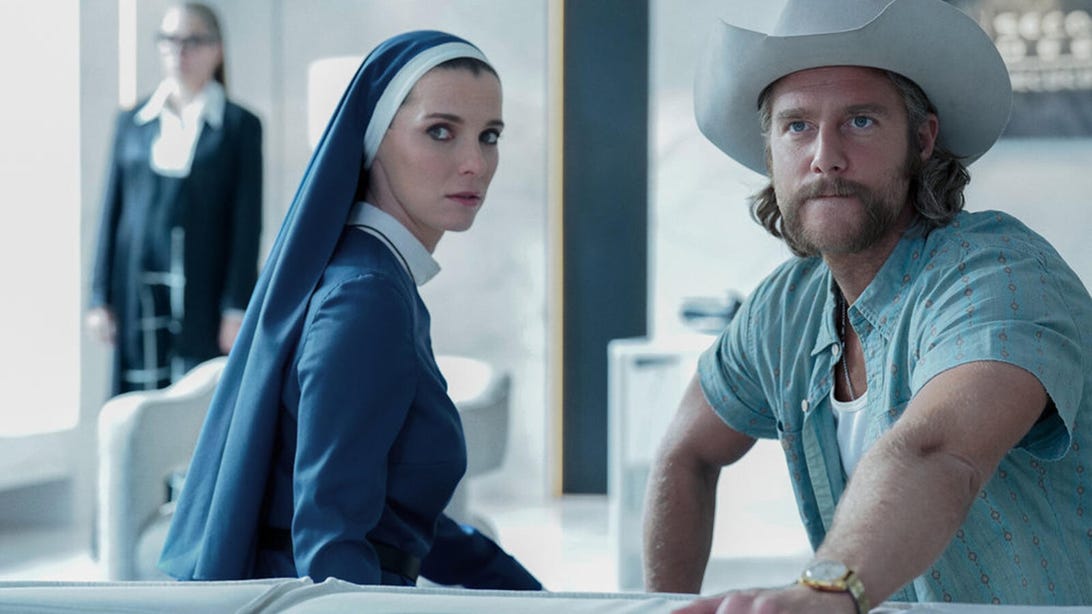Join or Sign In
Sign in to customize your TV listings
By joining TV Guide, you agree to our Terms of Use and acknowledge the data practices in our Privacy Policy.
Mrs. Davis Director Alethea Jones Took That Heist Seriously
'You can't be too silly, because it's already so silly'

Betty Gilpin and Elizabeth Marvel, Mrs. Davis
Colleen Hayes/Peacock[Warning: The following contains spoilers for Episode 6 of Mrs. Davis, "Alison Treasures: A Southern California Story." Read at your own risk!]
Mrs. Davis really does know it all — including how to pull off a heist.
Tara Hernandez and Damon Lindelof's Peacock series works wonders yet again in its sixth episode. Directed by Alethea Jones and written by Noelle Viñas and Alberto Roldán, it's an hour packed with magic tricks, buoyant capers, a showy betrayal, a hall pass from Jesus (Andy McQueen), and a possible resurrection. And that's before you get to the headline act: Simone's (Betty Gilpin) first conversation with Mrs. Davis herself. As poker player JQ (Chris Diamantopoulos) would say, it's enough to put a person on tilt.
The heist in question concerns Simone's mother, Celeste (Elizabeth Marvel), who has in her possession a special protective suit, the Lazarus Shroud, that Simone wants to wear to recover the Grail from the belly of a sperm whale. One problem with this plan is that Simone's dad, Monty (David Arquette), seemingly died in that suit when his final magic trick went horribly wrong. Celeste believes Monty is still alive and is convinced Simone is covering for him, so she's not eager to do her daughter any favors. If Simone wants the Shroud, she's going to have to steal it from Celeste's elaborately secured vault.
Simone and Wiley (Jake McDorman) lean on JQ and the resistance squad to plan a blockbuster movie-style heist, but their very cool operation falls apart when Celeste gets the drop on them. In a fake version of her office built on a soundstage, Celeste reveals a surprise of her own: She has photos proving Monty survived the Lazarus Shroud stunt that "killed" him on live TV. Shaken, Simone seeks out Mrs. Davis and finds out that the algorithm lied to Celeste about Simone's involvement, feeding her the idea that Simone helped her dad fake his own death. Most of this conversation occurs through a proxy in a diner, but when it all gets "too f---ed up" for the woman doing the proxying, she hands Simone an earbud so the nun and the algorithm can talk in private, and a tear runs down Simone's cheek.
All that and a love triangle with Jesus! The search for the Grail is bringing Simone and ex-boyfriend Wiley closer together, and Jesus endorses this nun's right to get a little action on the side. Simone balks, but when the news about her dad sends her into a panic attack that has her peeling off her clothes, she leans on Wiley for comfort, and it isn't the first time. A few years ago, she tried to have grief sex with him at her dad's funeral, which messed up Wiley for a while. This time, he doesn't stop her — but the fact that she suddenly finds herself in Jesus' restaurant in her underwear does.
For Alethea Jones, who also directed Episodes 3 and 4 of this season, and whose other credits include Grease: Rise of the Pink Ladies and Evil, the vulnerable restaurant scene was a highlight of the episode, one that took on a life outside the script. Jones spoke with TV Guide about asking Jesus to dance with a mop, planning a heist, and the magic that happens when the camera gets close to Betty Gilpin's face.

Betty Gilpin, Mrs. Davis
Colleen Hayes/PeacockI want to start with the heist, because it's so fun to watch the show play with different genres. What was your inspiration for the heist sequence?
Alethea Jones: I used to be a choreographer, so musicals and dance numbers sort of come naturally. And a few years ago, I realized that action and action montages were kind of like a dance. So when I read the heist, I was so pumped to direct it. I went back and I watched The Bourne Supremacy and The Bourne Identity, and I was interested in handheld, loose [camera work] — I wanted to take the heist really seriously, almost too seriously. So we really pushed the coverage. We had a lot more camera setups than this show is used to. We had three cameras in there just hosing it down. And in fact, funnily enough, that was my first day of shooting the show, and we had two camera units going, and I had a whole other new crew of people that were not the normal Mrs. Davis crew. We had to bring in a secondary crew. So I'm the new director with a new crew shooting a whole thing! We were like, "Is this even the show? We're not sure if we're shooting the proper show." But it works beautifully. It pops.
The boys have some cool tools, but then there are other aspects of the heist that are charmingly amateur, like their little model of Celeste's office with the dolls in it. How did you figure out how good you wanted them to be at heisting?
Jones: There was lots of discussion. This is a show that lives or dies by tone, and we have very extensive tone meetings. And Tara, Damon, and I had spoken about how you can't be too silly. You can't be too silly, because it's already so silly. So whenever I'm faced with a choice in that respect, I'll always go really serious, because to me, that's actually funnier. You look at the little dolls — the Durdens don't like Simone. So I was like, "Why don't we let them have the same male character [for her doll as for Wiley's] but they'll put a nun's habit on the man?" And it's kind of offensive that her face is just like [scowls]. I made sure that I had special macro lenses to get it. [In the model] I shot options without showing the fingers actually pushing the walls in, and then I just thought it would be so charming to have them. It's got to have a bit of a homemade quality. It was a balance between homemade quality but guys that have millions of dollars.
Same with when it's their training day in Episode 3. We had all of these proper Olympic athletes as stuntmen. They were in there doing the pommel horse, and they were rappelling down the wall, and they were all doing it really well, and I was like, "No, no, no. Undo your technique and make it that you taught yourself on YouTube. You have to be good, but you're self taught; you're not classically trained." So then you've got people kicking each other in the head in the background.
You also directed Episode 4, which has a running gag of Wiley thinking that everything happening to him is fake and that he's on a soundstage. And then in this episode, he actually does turn out to be on a soundstage. Was that parallel on your mind?
Jones: Yes, that was all very deliberate. That's a credit to Tara and Damon and the writers, because they wove that stuff in. It's there for the director to draw out and be like, Oh! But sometimes it's so dense. You're moving so fast, and you may not catch it, but the script is there. And in fact, it was meant to be a desert reveal, but the weather — the winds were really dangerous. The walls were meant to come down and they were going to be in the desert, so that callback in Episode 4 would have been, "[The walls] come down and we're in the desert." But then we had to change it to "We're on a soundstage."
A lot happens between Wiley and Simone in this episode, and I'm interested in the importance that's placed on Simone taking off her wimple. When she comes on to him at her dad's funeral in the flashback, she won't let him take it off, and then when they're together after the heist goes wrong, she does take it off. Was that in the script as well?
Jones: It wasn't in the script. But luckily, in Betty and Jake, you have a pair of tremendous filmmakers. It was Betty's idea that in that closet, when they're kissing in the flashback, could there be a touchstone that's them? She was like, "I don't know, does he touch my ear all the time?" Even in Episode 3, there's the ear touch. Wiley touches her ear in the apartment. And then Wiley touches the elderly lawyer's ear in the boardroom when he's running through his lines and repeating what he did with Lizzie, which was an idea that I had. We all joked that I had an ear fetish because I kept getting them to do it.
Simone, in that intimate moment with Wiley, goes to see Jesus. I'm curious how you approached directing that scene, because it's so vulnerable.
Jones: It's one of my favorite scenes. Tara and I also spoke about the female gaze, like what that looks like, for Simone and for me as a filmmaker. We're not objectifying Jesus, but we are gazing upon him. And we're so used to the female object averting her eyes away and allowing a male's gaze to sit on her, so now we're doing that [in reverse] with Simone. I'm doing it as the filmmaker, and Simone is doing it as the character. It's a really important thing. It's incredibly vulnerable. I'm going to give a big shoutout to our Steadicam operator, Nich Musco. I was like, "I need you to dance with Andy." In the script it's just a few lines of him just mopping, and Tara and I spoke about, "What if he was more dancing?" I spoke to Andy, who plays Jesus, and asked him if he could dance. I arranged for an earwig to be there on set, and I had him supply some tracks to mop to that he was comfortable with. I played them, and then I said, "Andy, do you mind if I change it?" And he's like, "Go for it." And I played this beautiful piece of music by a composer called Peter Gregson. It makes me so sad. I put it on and it changed everything. And then we just kept using the really sad tracks. So he was mopping, and my Steadicam operator, I tried to really empower him to just get low — I like activating people's artistry. So I was encouraging Nich to follow his heart as well as his Steadicam — like, dance with him, go where you need to go. He brought some beautiful shots.
Even though you were using different music on the day, did you already know what the song would be in that scene?
Jones: No, our beautiful editor Phil Fowler — I've done three shows in a row with Phil now. He happened to do the pilot with Owen [Harris], but I'd already done a show before that with him, Rise of the Pink Ladies. Phil sent me his editor's cut, and he'd put that Nat King Cole song ["Fascination"] in, and I was like, "Whoa, this is incredible. Where did it come from, Phil?" He said he went to the music supervisor, and she supplied a bunch of options, and he laid it in. And it stayed there from the editor's cut through my director's cut through the producer's cut to the network. That's a song that stayed. I've never heard it before! I grew up listening to Nat King Cole.
Another aspect of that scene that's interesting is that Simone doesn't have to say Jesus's name if she doesn't want him to see her. Why do you think that she does?
Jones: I think she's in a marriage with him, and she wants to bring a level of transparency. She's guilty and a little bit ashamed and just wanting to be honest with him. I really love that she chose to say it.
Do you see any parallels between that and the fact that she allows the vulnerability of taking off her wimple with Wiley?
Jones: The whole sequence is incredibly vulnerable, just in every way. The nakedness. We had a big talk about her being in her underwear in the falafel store and what she grabs. I had to layer in crates of vegetables because I was like, "What can she grab?" There's no cloth in there. So we had to have a vegetable delivery where she could grab the burlap off the top of the vegetables. It's funny, with my editor Phil, just for fun, I gendered all my episodes. I'm like, "Six is a girl. Three is a boy. And four is nonbinary. It just is." And that just sat so well with me. I even wrote to the director of Episode 7, Fred Toye, and I was like, "What gender is Episode 7?" It's not a gender at all.

Betty Gilpin and Jake McDorman, Mrs. Davis
Greg Gayne/PeacockThere's a scene toward the end of the episode when Simone finally talks to Mrs. Davis, and you just hold on Betty's incredible acting. It's a much softer moment than you might expect given how much anger she has toward the algorithm. What emotions did you want to hit with that scene?
Jones: You don't have to push Betty too much to get incredibly complex situations. I don't even know if we spoke about it that much, to be honest, and that's just props to Betty. We wanted release. There's so much rising tension building across all of the episodes that it just felt like that was the most elegant result, that she just cries. Betty then took it from there and had it all, with what she was hearing in her head and the information she was getting. And I think it's important to keep the mystery as well — the audience doesn't really know what she's hearing in that scene. I thought she straddled that line really beautifully.
Did you have something that she was listening to on set?
Jones: No. She's incredible. In Episode 4, in the sequence where she's marrying Jesus, I had this idea to stick a camera up the veil. I saw the makeup artist doing [Betty's] touch-ups under the veil, and I said to Joe [Anderson], the cinematographer, "What if we put the camera up the veil?" And then I've got to go to my lead actress and be like, "Hey, can we have a camera looking up your nose?" For a start, she could have said no to that. Secondly, once we get up there, tears start rolling down [her face]. She's got a camera right up here inside with her. An operator is there as well, under there. I didn't ask her to be moved to tears. I was just going to take what I could. I was just thrilled to be there.
I also want to shout out one of my favorite lines of this episode, which is when Wiley repeats, "You're a big strong boy, everybody loves you, you're never gonna die." How did you and Jake find the right rhythm for that chant?
Jones: That's not a scripted moment. We were very short on time. We put all of our time into the blood coming out of his nose. I was like, "Just give me a tube of blood coming out on the right of his face. It'll be like a high school play moment. It'll work." No one thought it would work. Jake was dubious. So we put all this time into the blood, and then we get to him psyching himself up to punch himself, and we are low on time. And I don't have many takes, as well, because there's going to be blood coming out eventually. So I turn the camera on and I say to him, "I'm going to push in and you're gonna punch yourself when we get there. You've got to psych yourself up." Out of nowhere he starts bouncing up and down and saying it. I say, "That's incredible, Jake. I don't know where that came from. Let's go again." We go again. And then we move on. I'm like, "OK, got it. Let's do the punch. Let's get the blood." He's like, "Whoa, whoa, whoa, Alethea, do you want anything else? That was a lot." And I said, "It was magical, Jake. That could be a teaser moment." Even that night, he texted me, "I'm really anxious about that moment. Do you think we got it?" And I was like, "Jake, it's so funny." Credit to Jake; he's a wonderful collaborator. He brings ideas and he trusts. He was unsure — I'm like, "No, it was heaven." And it was.
New episodes of Mrs. Davis premiere Thursdays on Peacock.
